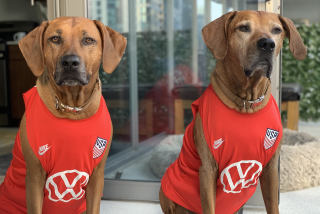Ashley Whippet and His Great Leap to Stardom
- Share via
Alex Stein had a dream 15 years ago while a college student at Ohio State University. He dreamed that the 3-week-old puppy he’d just adopted would be famous.
In fact, the puppy would become Ashley Whippet, the dog who captured the World Frisbee Disc Canine Championship in 1975, 1976 and 1977, clinching the popularity of the sport that pairs a dog’s speed and agility with human strength. Irv Lander, Stein’s partner and co-promoter of the Ashley Whippet Invitational, a yearly contest held throughout the United States, says, “The sport provides both dog and owner with an excellent cardiovascular workout.”
Stein, 35, and his dogs have appeared on a number of television shows and have performed as part of half-time and pregame shows in most of the major stadiums in the country. In 1977 they appeared at the Super Bowl in New Orleans. They even gave a performance at the White House for Amy Carter, after which they taught her dog, Grits, to catch a Frisbee. All this caused envy in some of Stein’s more traditional classmates at Ohio State, who are still incredulous that someone could make a living and find fame in so unconventional a manner.
Fed From a Frisbee
While still a student, Stein knew that he had stumbled on something that had never been done before. He weaned his 3-week old puppy, a gift from a girlfriend, by feeding him from a Frisbee. Then, when Stein threw the disc, the dog learned to retrieve it, thinking it was his food dish.
By the time Ashley was 6 months old, he could jump 12 feet in the air to retrieve the disc. Stein would take the dog to the college green on the main campus around the time classes let out, and start throwing the Frisbee. He says, “The next thing I knew, there would be a crowd making a circle around us. Ashley would run, soar through the air, catch the Frisbee and bark. His loud, piercing bark would bring out people who were on the other side of the green. I did this every day on the campus, and I’d always get the same kind of crowd. The thought came to me, ‘This dog is something special.’ The dog amazed me. He would jump in the air and extend himself to the greatest limit that a dog could leap. It was like ballet. I knew there was some money to be made on it.”
In 1972, Stein decided to try his luck in Hollywood. He says, “I thought I might take the dog out to make a commercial, but then I met with one of the trainers of dog actors. He said, ‘Hey, kid, if you think you’re going to make the big time off your dog, you had better think again. All they pay you is $100 a day, and if you can get one commercial a year, you’re lucky.’ ”
Talent agents were also negative. Stein says, “I would call agents on the phone and say, ‘I have a dog who weighs 28 pounds and stands 21 inches high at the shoulder, who can jump upwards of 9 feet in the air and can catch a Frisbee at 100 yards. They would answer, ‘You have a what that does what?’ and hang up. One even called me a crackpot and said they didn’t talk to people like that.”
Discouraging Contacts
His first contacts with the manufacturers of the Frisbee, Whammo Corp., were also discouraging. Stein says that some of the executives were put off by his wild looks and brash manner. He admits that at that time he looked like a typical student of the 1970s, with long hair adding to his rebellious appearance. At that time Frisbee catching was a rarity although the International Frisbee Assn. had a canine corps.
At one of the meetings with Whammo, Stein met Irv Lander, then president of the International Frisbee Assn. and now his partner. Lander was attracted by Ashley’s talent and by Stein’s optimism and determination. Lander says, “If I had to cut through red tape to accomplish something, I would ask Alex Stein to do it because he can cut through any obstacle and get success. He has been a good person for me to be around.” Lander also shares Stein’s love of dogs. Finally in 1974, Stein’s persistence led Whammo to invite him to appear at the World Frisbee Championships, to be held later that year in the Rose Bowl.
In the meantime, Stein had been living at the beach for a year, painting houses for a living and training Ashley to further refine his skills. He finally realized that he would have to do something spectacular to get attention. This opportunity came in August, 1974, at a televised game between the Dodgers and the Cincinnati Reds at Dodger Stadium. Stein sneaked Ashley into the stadium, and at a fortuitous moment dashed out onto the outfield, timing their appearance to come after the commercial break preceding the ninth inning. Stein tossed his Frisbee, and Ashley went after it, soaring into the sky. The crowd roared and cheered at the unscheduled performance. The show went on for about eight minutes, after which Stein was arrested and separated from his dog. A 15-year-old boy sitting in the front row managed to lure Ashley off the field, taking him home to Long Beach.
Stein, meanwhile, found himself in a holding tank at Parker Center, worrying about his dog. Several hours later he was released, charged with trespassing. Later, he was fined $250. Through an article on The Times’ sports page and announcements on a local television program he was reunited with Ashley after several days. But the unscheduled appearance brought invitations to do half-time exhibitions at Rams’ games and to appear on several talk shows, resulting in a certain amount of national prominence.
Stein attributes much of his success to the fascination people have with animals. He says that on many occasions when they went into studios, otherwise blase employees would come out of offices and ask for Ashley’s “pawtograph.” “In visibility dogs attract more attention than humans because they have an explosive energy,” he says. “You don’t know their limits. Whenever Ashley would make a tremendous leap in the air to catch the Frisbee you would hear a roar from the crowd.”
Throughout 1975 and 1976 Stein waited for another break. On his own he contacted the Miami Dolphins and the St. Louis Cardinals and performed in half-time shows for both, selling himself through his letters. Finally, in 1977 he approached Lander, who decided it was about time to start a national contest for people who had trained their dogs to catch Frisbees. The contest, which is now sponsored by Gaines Dog Food, was originally sponsored by KalKan. The competition is now called the Ashley Whippet Invitational, and Stein spends about 25% of his time promoting it and serving as judge throughout the country.
When Ashley Whippet died earlier last year at the age of 13, he was eulogized in sports magazines, newspapers and on television. Stein, who lives in a small house with a large yard in Sierra Madre, is grooming three of Ashley’s 60 offspring, Lady Ashley, Ashley Whippet Jr. and Ashley Whippet III, to continue the tradition of performing at exhibitions of canine disc-catching and at sporting events. In the past three years they have performed in over 20 major stadiums.
Lander says Stein’s demands for Ashley’s comfort and safety have resulted in generally better treatment of dogs on airplanes and in hotels. Ashley flew about 60,000 miles a year and belonged to frequent flyers’ clubs for United, TWA and American Airlines. Stein and Lander also put on exhibitions for charity and fund-raising events.
Stein says that his college friends have expressed envy of his rather flamboyant life style, and that girlfriends are sometimes jealous of the time he spends with his dogs and on the road promoting the exhibition. But, he says, “I would do this even if I didn’t make money from it.”
Lander attributes much of Stein’s success to his uninhibited personality and the fact that he never looks back. He says, “Alex can do things without worrying too much about the consequences. He reaches for new horizons. The fact that he served as a catalyst for an emerging sport that brought new respect for dogs has caused many people to come up to us when we are on the road and thank us for what we are doing.”
More to Read
Sign up for Essential California
The most important California stories and recommendations in your inbox every morning.
You may occasionally receive promotional content from the Los Angeles Times.













